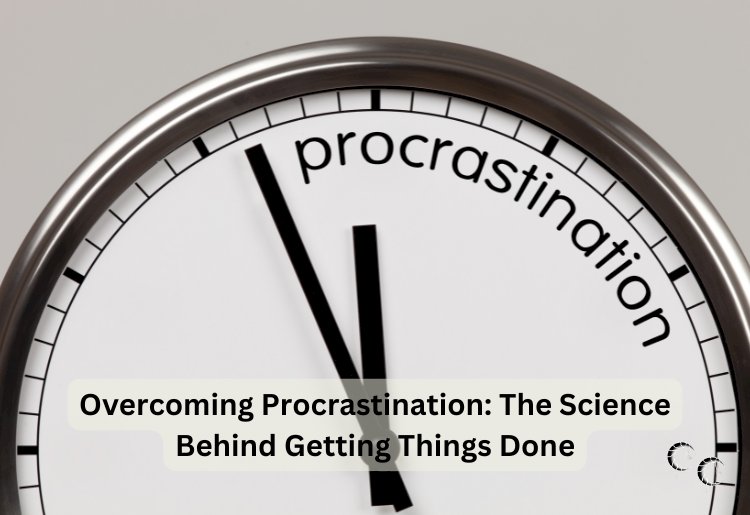Overcoming Procrastination: The Science Behind Getting Things Done

Procrastination is a common hurdle many of us face, whether it’s avoiding a work task, delaying a personal project, or even putting off household chores. It's easy to feel guilty about procrastination, but understanding the science behind it can help you manage it better. Once you understand why you procrastinate and learn strategies to combat it, you can take control of your productivity and start achieving your goals.
The Psychology Behind Procrastination
Procrastination isn’t simply about laziness or poor time management. It’s rooted in psychology and has more to do with emotions than logic. Here are a few key psychological factors that drive procrastination:
- Immediate Gratification: Our brains are wired to seek instant rewards and avoid discomfort. Procrastination often occurs when we choose short-term pleasure over long-term goals. For example, watching TV or scrolling through social media offers immediate satisfaction, while completing a task may feel tedious or overwhelming.
- Fear of Failure: Many people procrastinate because they’re afraid of failing or not meeting their own expectations. This fear can create a cycle of avoidance, where putting off a task feels safer than confronting the possibility of failure.
- Perfectionism: Perfectionists often delay tasks because they have very high standards. The fear of not doing something perfectly can lead to procrastination as they delay starting in an effort to get everything "just right."
- Task Aversion: If a task feels boring, overwhelming, or unpleasant, it’s easy to put it off. Our brains seek out activities that are enjoyable or fulfilling, so tasks that don’t provide immediate gratification are easily avoided.
The Neuroscience of Procrastination
The brain’s decision-making system is key in understanding procrastination. When faced with a task, the brain evaluates the potential reward and effort involved. This is where the concept of “self-regulation” comes in—our ability to control emotions and behavior to pursue long-term goals. Procrastination happens when the brain’s reward system becomes more focused on short-term pleasure than long-term benefits.
Research has shown that the prefrontal cortex (responsible for planning and decision-making) and the limbic system (responsible for emotions and rewards) are involved in procrastination. When the limbic system takes the lead, it can override the rational planning function of the prefrontal cortex, making the easier, more pleasurable tasks more appealing. This neurological tug-of-war is what makes procrastination so difficult to overcome.
Techniques for Overcoming Procrastination
While the science behind procrastination can feel overwhelming, there are practical strategies you can apply to overcome it. Here are some effective techniques to help you combat procrastination:
- Break Tasks Into Smaller Steps: Large tasks can be intimidating, which is why it’s easy to put them off. Break them down into smaller, more manageable steps. By focusing on completing one small part at a time, the task becomes less daunting, and you’re less likely to procrastinate.
- Use the Pomodoro Technique: The Pomodoro Technique involves working in short, focused intervals—usually 25 minutes—followed by a 5-minute break. This method keeps you engaged and prevents burnout, allowing you to make progress without feeling overwhelmed.
- Set Clear, Achievable Goals: Having clear and specific goals can help you stay focused and motivated. Make sure these goals are achievable and break them down into actionable steps. Instead of saying, “I need to finish this report,” aim for something like, “I’ll write the introduction and the first two sections today.”
- Establish a Routine: Consistency can help you overcome procrastination. Create a daily routine that includes time blocks for specific tasks. This helps build momentum and reduces the temptation to put things off. When you make work a regular part of your day, you’re less likely to procrastinate.
- Eliminate Distractions: Procrastination often thrives in environments filled with distractions. Identify the things that typically draw your attention away from your tasks—social media, noisy environments, or personal devices—and eliminate or minimize them. Set boundaries to reduce distractions, such as turning off notifications or using apps like Focus@Will that provide music to help you concentrate.
- Practice Self-Compassion: Be kind to yourself if you’ve been procrastinating. Beating yourself up for putting something off can lead to feelings of shame and guilt, which can make procrastination worse. Instead, acknowledge that procrastination happens and use it as an opportunity to learn. Practice self-compassion and focus on how you can take small steps to improve moving forward.
- Use the 2-Minute Rule: The 2-minute rule suggests that if a task will take two minutes or less, do it right away. This helps you tackle small tasks that might otherwise pile up and contribute to procrastination. By knocking out small tasks quickly, you’ll feel more accomplished and be motivated to take on bigger tasks.
The Role of Motivation and Willpower
While motivation and willpower can help you push through procrastination, relying on them alone can be exhausting. Instead, develop strategies that make it easier for you to take action, like setting a timer for focused work or creating a checklist. Remember, motivation can be built through action. The more you take small steps toward your goals, the more motivated you’ll feel to keep going.
Conclusion
Procrastination is a complex psychological and neurological challenge that many people face, but it’s not insurmountable. By understanding the science behind it and applying practical strategies—such as breaking tasks down, using time management techniques, eliminating distractions, and practicing self-compassion—you can overcome procrastination and boost your productivity. Taking consistent action and learning from each experience will help you develop a healthier relationship with your tasks and goals, leading to greater success in both your personal and professional life.






























